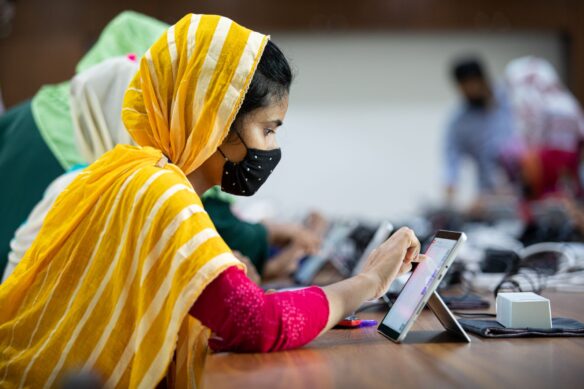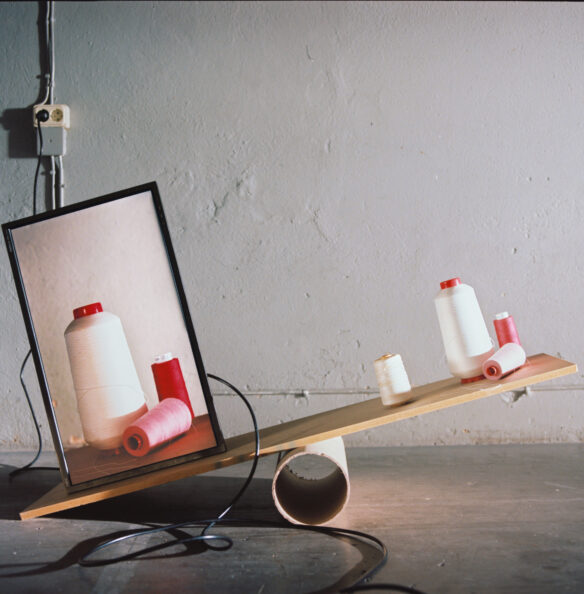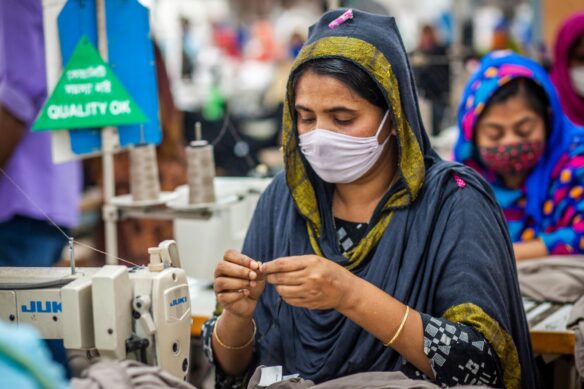The Ready-Made-Garments (RMG) industry employs approximately 4.1 million people in Bangladesh, with women holding a sizable 56 percent of the jobs. But this is a declining trend from the 1990s, when women made up almost 90 percent of the RMG workforce.
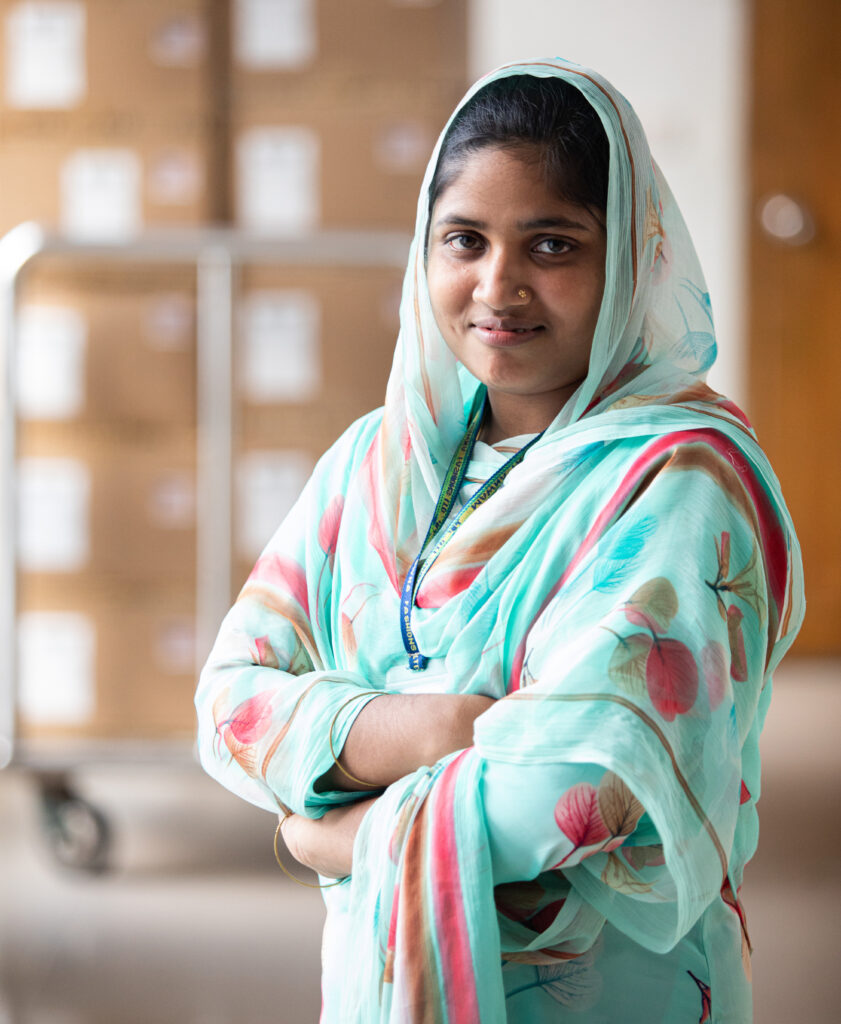
Despite its positive contribution to women’s financial empowerment over the decades, the sector has not made the same rate of progress in ensuring decent work environment, and diversifying job roles for women workers. The clear majority of the women workforce is disproportionately employed in low-skilled jobs, with minimal opportunities for career mobility.
At the same time, the use of automation and digital technology is making its way into the textile industry, and approximately 2.7 million RMG workers in Bangladesh stand to lose to their livelihoods in the next 20 years. Women are particularly at risk, as they are often employed to execute the tasks which are highly susceptible to automation. These uncertainties are worsened by the negative gender stereotypes on women not being able to handle high technology, along with the economic insecurities in health, social safety nets and other aspects in their daily lives. There are multi-layered and interconnected challenges with a limited scope of improvement, if multiple aspects are not addressed simultaneously.
Oporajita is equipping women for
the future
The collective impact initiative Oporajita brings together a diversified group of stakeholders which collectively are working to ensure that women garment workers have access to the relevant working skills and competences needed for their future of work, while operating in an environment that is enabling and inclusive of their choices. The activities within the initiative are defined, implemented and evaluated together with the women garment workers themselves and cover multiple needs within three thematic areas that significantly impact their lives.
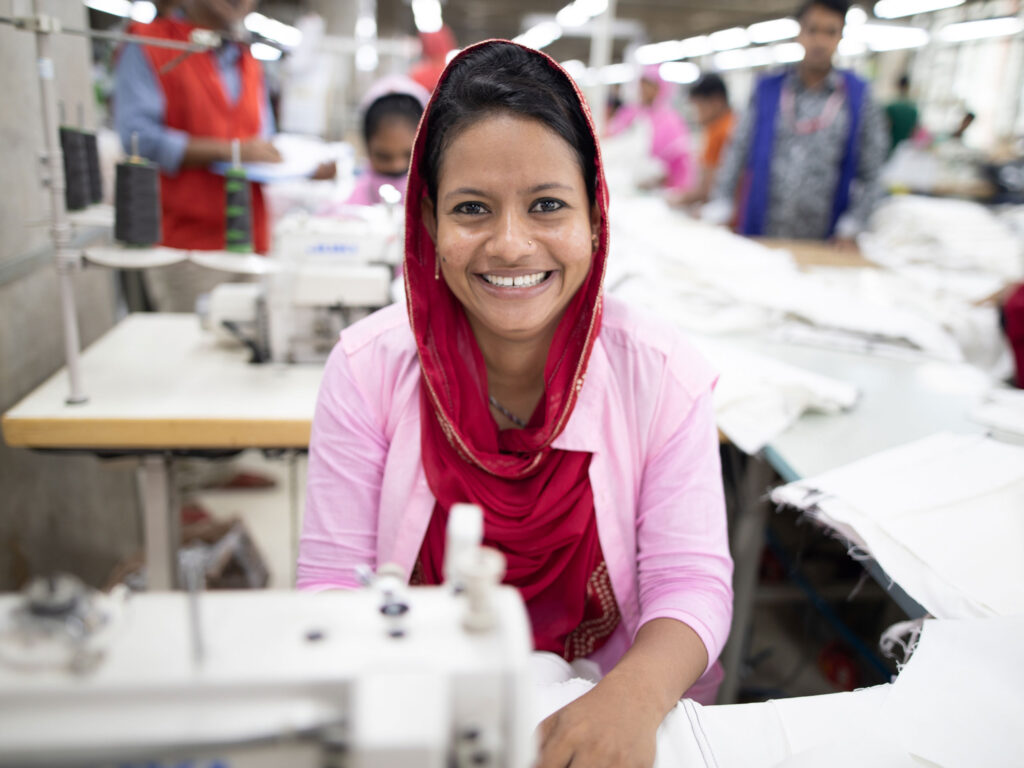
Enabling Environment – Within this area we ensure a safe working environment, in which women have agency to lead secure, dignified, and fulfilling lives. For instance, by providing access to hygiene practices and health services, gender-sensitive digital financial literacy as well as by promoting gender-inclusive practices. At community and household level we are providing girls’ STEM education, parenting support and childcare. Beyond this, we are working with perception change activities which are targeting the broader community to challenge existing stereotypes of women’s roles connected to technology, career development, and leadership.
Skills Training – Within this scope, we facilitate career development within and beyond the RMG sector, by providing relevant skills training in both power skills like leadership and communication and technical skills needed to become a multi-machine operator. Additionally, out-of-work garment workers are supported with alternative livelihood opportunities through skills training in micro-entrepreneurship and jobs tied to the circular economy.
RMG Sector Competitiveness – The activities within this thematic area contributes to an RMG sector that is more inclusive and resilient to automation and emerging competition. It has a concerted focus on sustainability by identifying possible linkages and collaborative actions between major stakeholders, and by piloting human-centered innovations, including the creation of jobs within a circular economy, that increases the employability of women RMG workers.
The Oporajita partners
Strategic and funding partners
H&M Foundation – Initiator and funder of the initiative Collective Impact of Future of Work in Bangladesh
Sweden – Co-funder of the work of the implementing organisations within the Collective Impact Initiative, and collaborates with the H&M Foundation to achieve system change.
The Asia Foundation – Local backbone organization which coordinates the cluster of implementors.
FSG Inc – Strategic partner which co-designs the collective impact infrastructure.
Implementing partners
Enabling Environment
WaterAid Bangladesh – Expands access to hygiene and WASH information and improves women friendly WASH facilities within workers’ communities and educational institutions. Beyond this, we train local members of the community to operate and maintain the sanitation facilities to ensure their longevity.
We also conduct menstrual hygiene management sessions with women participants at factory locations, educational institutions and within the workers’ communities.
Save the Children Bangladesh – Ensures child protection services, parenting support and enhances nutrition for children by providing care arrangements at community level. Via the daycare centers we ensure prevention and response against violence against children among parents, family member and community members by arranging court yarded meetings, material dissemination, home visits and awareness campaigns.
Beyond this, we improve STEM opportunities for young children with a special focus on girls. In collaboration with secondary school authorities, we implement STEM at schools by developing a STEM curriculum and carry out STEM sessions.
CARE Bangladesh – Increases the proportion of skilled women in managerial and supervisory roles in the RMG sector through improved access to gender responsive soft-skills coaching. These power skills are about communications, leadership, problem solving, time management, team work etc. Our work includes gender responsive HR management and staff development program, and the establishment of a mentor network of RMG women leaders to inspire potential women workers to pursue managerial/supervisory roles.
In addition, we tackle gender-based discrimination and harassment through developing gender-responsive human-resource management in factories. Our Gender Equality and Social Inclusion Assessment Toolkit evaluates the factory environment and based on this we provide training to factory management and supervisors on gender discrimination, equity and gender-based-violence.
Skills Training
iDE (International Development Enterprises) – Increases the micro-entrepreneurial capacity of out-of-work women garments workers by providing training on enterprise development services to start their business, and access to financial products and marketplaces to grow their business.
Circular Apparel Innovation Factory (CAIF) – Creates sustainable livelihood opportunities for out-of-work RMG workers through identifying and developing capacity on circular jobs and circular micro-entrepreneurship models.
Shimmy – Delivers a range of upskilling services through gamified tablet-based modules that provide women workers with the technical knowledge to move into higher-paying roles such as multi-skilled machine operator, digital design worker etc.– roles that will increase in demand as traditional production jobs lessen. This upgrade in skills can help women secure a better livelihood for themselves and their families.
Center for Communication Action (C-CAB)– Carries out a perception change campaign in the broader community about women’s roles in career, technology and leadership, in order to improve retention and increased share of women in technology and leadership roles in the RMG sector.
United Nations Capital Development Fund (UNCDF) – Coordinates innovative initiatives that aim to increase women garment workers’ access to digital financial literacy, health services and social security schemes, reducing the anxieties of economic uncertainties.
Swisscontact – Provides technical skills training to unskilled and low-skilled garment workers (particularly women) in RMG factories. These workers include new-entrants who are seeking longer-term employment as operators in the RMG sector and existing low-skilled women workers who need upskilling and multi-skilling to improve their productivity and resilience to technological-shifts, including automation and green technologies.
RMG Sector Competitiveness
LightCastle Partners – Organizes a Dialogue Series where major stakeholders in the local and global RMG sector decide on inter-linkages and collaborative actions on the competitiveness of the sector and the employability of its women workers. This includes an industry-wide technological landscape study to assess the existing level of automation in the RMG sector of Bangladesh and how it will affect the need for an upskilled or reskilled workforce, as well as skills development programs.
ygap – Runs a Challenge Fund to pilot gender-sensitive innovations that increases the competitiveness of the RMG sector while increasing the employability of women workers. The women entrepreneurs are provided bootcamps with incubation support which includes gender sessions delivered by Gender and Inclusion experts, and industry leaders engaged to provide first-hand advice, insights, and guideline.
